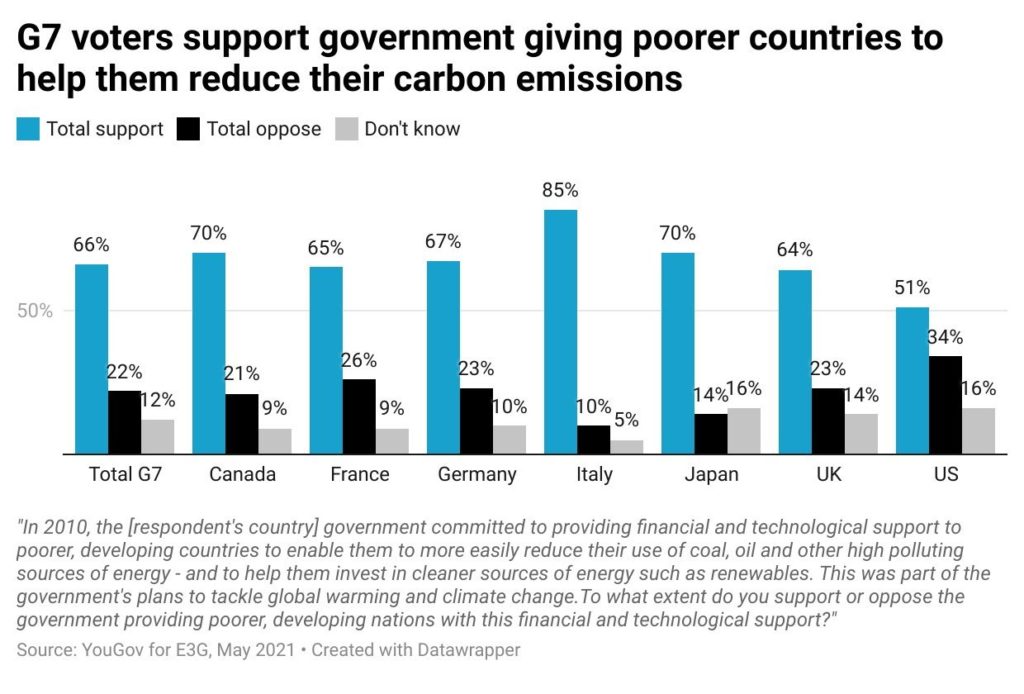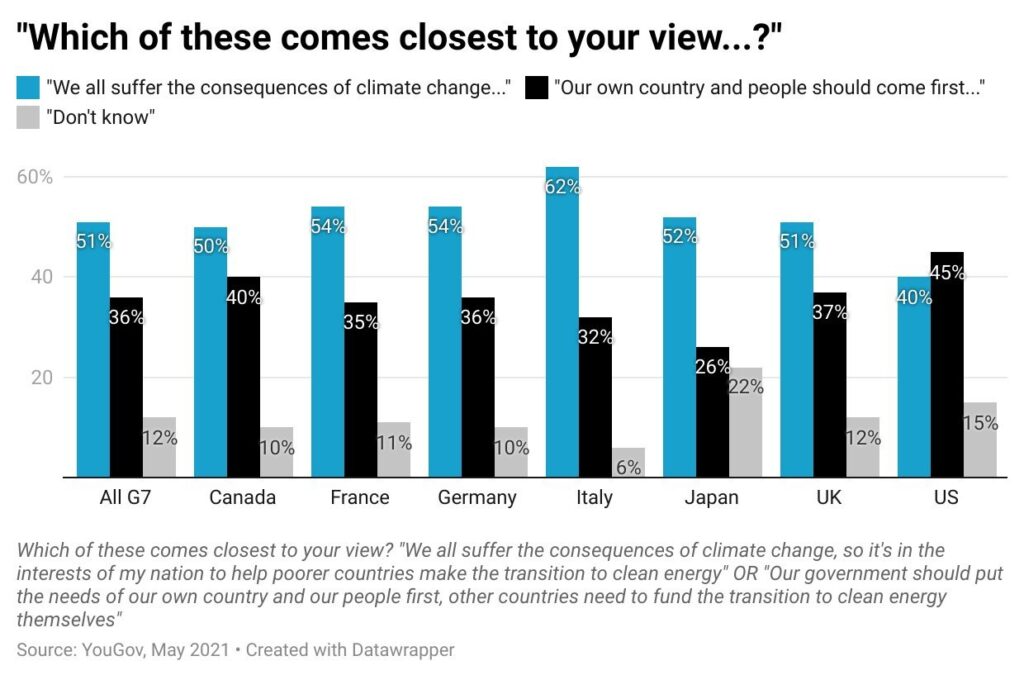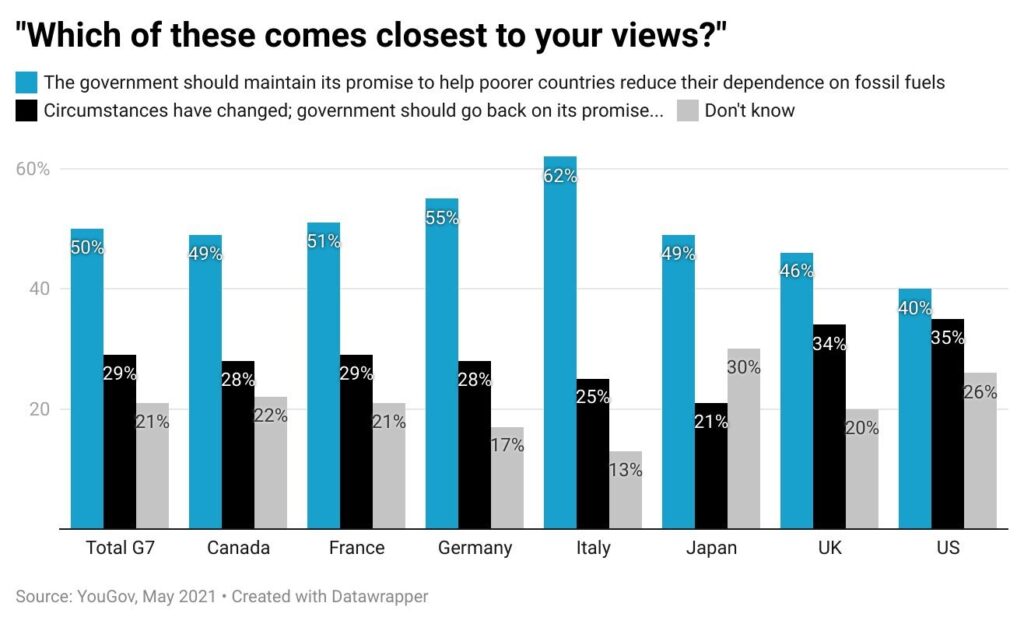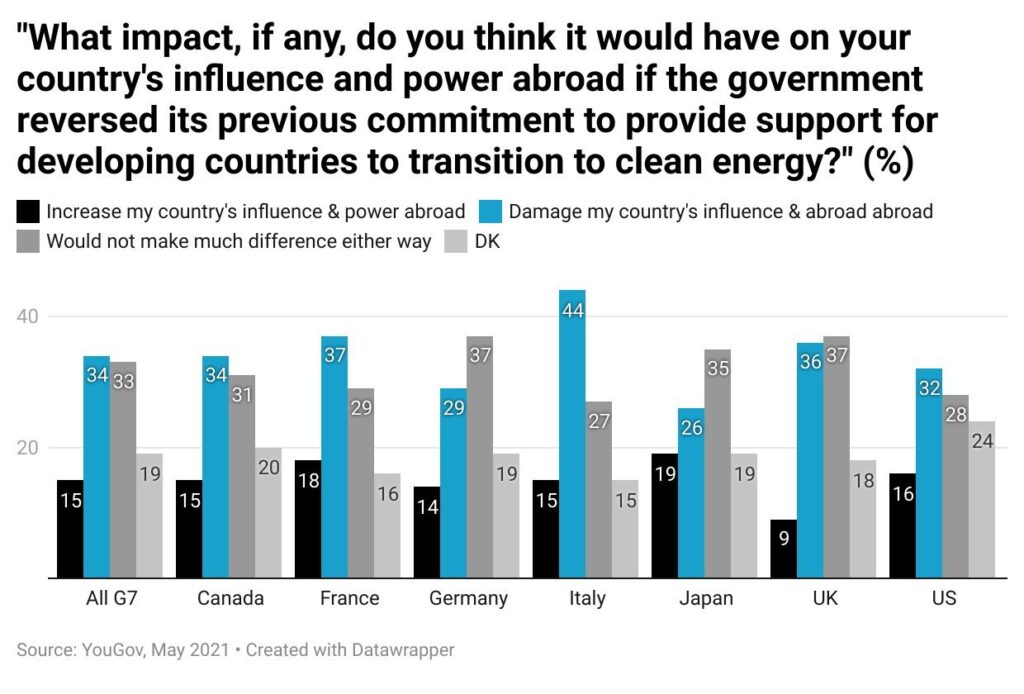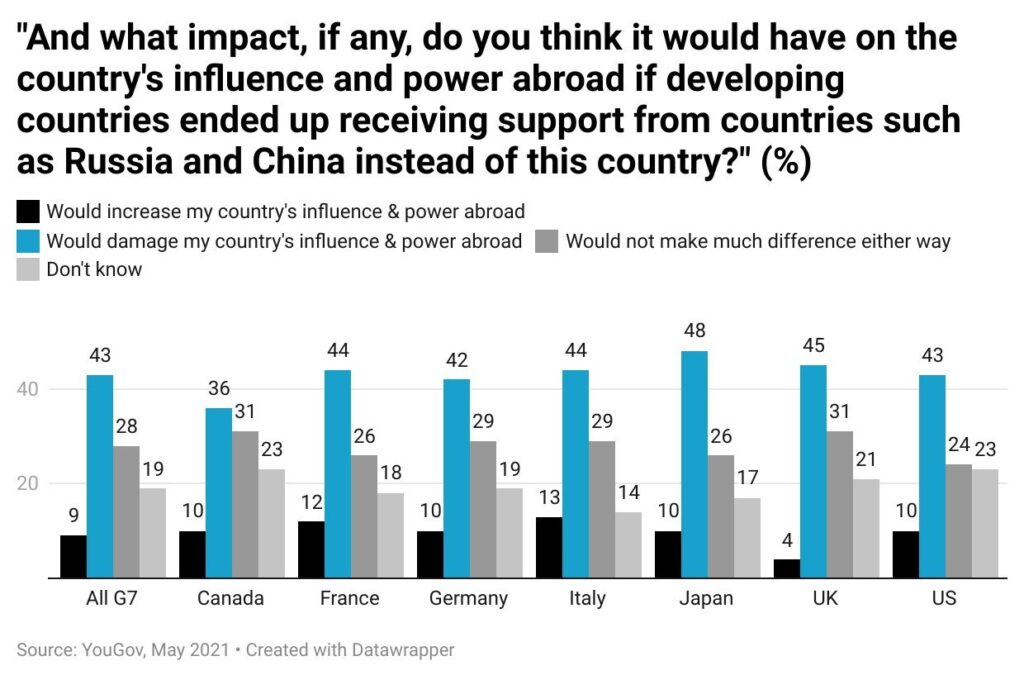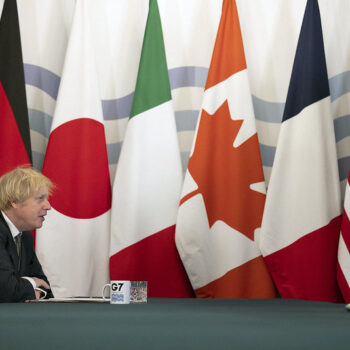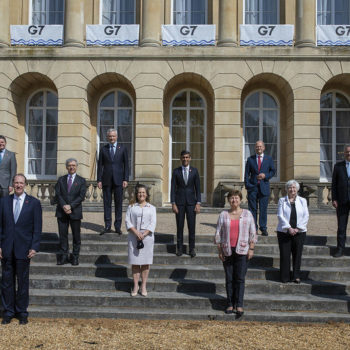- Overall, there is overwhelming public support across all seven G7 countries for climate finance commitments to poorer countries to help them transition to clean energy. Taken as one, 66% of voters in G7 countries support this, with clear majorities of support in all seven countries.
- Publics in all seven countries want their government to stick to their previous climate finance commitments. 50% of G7 voters want their government to stick to their pledge, while just 29% think circumstances have changed sufficiently that their government should go back on their pledge.
- This may be due to how universally climate change is now seen as a threat to us all. 51% of people in G7 countries say “climate change affects us all, so it’s in the interests of my country to help poorer nations make the transition to clean energy” whereas just 34% say their government should only focus on their own people and country.
- 43% of G7 voters think it would damage their home countries power and influence abroad if Russia or China stepped in and helped these poorer nations instead.
- Support for the measures was high in all seven G7 countries, but highest in Italy (85%).
Story
Ahead of the G7, YouGov polling for think tank E3G shows overwhelming public support across Canada, France, Germany, Japan, Italy, the UK and the US for helping poorer countries cut their dependence on fossil fuels. Taken as one, 66% of voters in G7 countries support this, with clear majorities of support in all seven countries.
Publics in all seven countries want their government to stick to promises made at the UN in 2010 to deliver $100 billion of climate finance a year. 50% of G7 voters want their government to stick to their climate finance pledge, while just 29% think circumstances have changed sufficiently that their government should go back on their pledge.
From June 11-13 leaders of the G7 will meet to discuss issues like vaccine equity and climate finance distribution in Cornwall, UK. There’s speculation G7 leaders will fail to meet a 2010 promise to deliver $100bn a year to developing nations. On these numbers at least, G7 voters would be massively against that.
A report last week from CARE International reveals that the G7 countries have no clear plan to deliver the promised $100 billion climate finance commitment to poorer countries.
Separately, analysis from Tearfund finds G7 countries committed $189 billion in the past year to support the oil, gas and coal sectors. You can find country-specific results along with the aggregated data here.
Country findings
UK
- YouGov show overwhelming support among UK voters for providing developing nations with financial and technological help to transition to clean energy. These measures are backed by 64% of voters, with just 23% opposing it and 14% being unsure. Those backing the policy include a majority of Conservative (52%) and Leave (50%) voters.
- YouGov show overwhelming support among UK voters for providing developing nations with financial and technological help to transition to clean energy. These measures are backed by 64% of voters, with just 23% opposing it and 14% being unsure. Those backing the policy include a majority of Conservative (52%) and Leave (50%) voters.
- YouGov show overwhelming support among UK voters for providing developing nations with financial and technological help to transition to clean energy. These measures are backed by 64% of voters, with just 23% opposing it and 14% being unsure. Those backing the policy include a majority of Conservative (52%) and Leave (50%) voters.
Japan
- Overall, 70% of Japanese citizens support providing poorer, developing countries with financial and technological support to help them transition to clean energy. There are clear majorities of support across gender, all age groups and in every region.
- Support is highest among those aged over 55 years of old.
- 49% of Japanese citizens believe “the government should maintain its promises to help poorer countries reduce their dependence on fossil fuels” compared to just 21% who say “circumstances have changed and the government should go back on its promises” to those countries (the remaining 30% say they don’t know).
- 52% of those polled agreed with the statement “We will all suffer the consequences of climate change, so it’s in the interests of Japan to help poorer countries make the transition to energy”, with only a minority (26%) saying the government should solely focus on Japanese citizens.
- 48% of the Japanese public believe that it would damage Japan’s influence and power abroad if developing countries started receiving support from Russia and China instead of Japan.
Germany
- 67% of German citizens support providing poorer, developing countries with financial and technological support to help them transition to clean energy. There are clear majorities of support across gender, all age groups, across every region and every income group.
- The measures were backed by voters of every party, with the exception of AFD voters (and even among these voters, 44% support the measures). 74% of CDU voters support giving money to poorer nations to help them to transition to clean energy.
- 55% of Germans believe the government should keep its promises to developing nations on this matter, with just 28% saying circumstances have changed sufficiently that they believe the German government should go back on its previous pledges.
- This appears to be driven by the universal threat of climate change. 54% of Germans believe that “we all suffer the consequences of climate change, so it’s in the interests of Germany to help poorer countries make the transition to clean energy” with just 36% choosing instead to believe “our governments should put the needs of our own country and people first, other countries need to fund the transition to clean energy themselves.
US
- 51% of US citizens support the US government providing poorer, developing countries with financial and technological support to help them transition to clean energy. This includes 20% of Donald Trump’s voters.
- 40% of the US public say the government should maintain its promises to poorer countries on climate finance, with 35% saying they should go back on them.
- 43% of voters believe that it would be damaging for US influence and power abroad if Russia and China filled the vacuum and provided support to developing countries.
France
- 65% of the French public support the French government providing poorer, developing countries with financial and technological support to help them transition to clean energy. There is majority support for this in every region and in age group (even a plurality of Marie Le Pen voters support this stance).
- 51% say the French government should maintain its promises to developing countries on this matter, despite the context of the pandemic, while just 29% say circumstances have changed sufficiently that the government should go back on previous pledges.
- 54% of the French public believe that “we all suffer the consequences of climate change, so it’s in the interests of France to help poorer countries make the transition to clean energy” whereas just 35% say the government should focus solely on its own citizens.
- 44% of the French public say it would be damaging for France’s influence and abroad if Russia and China stepped in to provide support for developing countries in place of France.
Canada
- 70% of the Canadian public support the Canadian government providing poorer, developing countries with financial and technological support to help them transition to clean energy. There is majority support for this position among every age group, region and in every voter group.
- When asked to choose, 49% say the Canadian government should maintain its promises to developing countries on this matter, despite the context of the pandemic, while just 28% say circumstances have changed sufficiently that the government should go back on previous pledges.
- 50% that “we will all suffer the consequences of climate change, so it’s in the interests of Canada to help poorer countries make the transition to clean energy” while 40% choose the opposing statement, that the government put the needs of its own country and people first and leave poorer countries to fund their green transition themselves.
Italy
- 85% of the Italian public support the Italian government providing poorer, developing countries with the financial and technological support to help them transition to clean energy. Just 10% oppose.
- 62% say the Italian government should maintain its promises to developing countries on this matter, despite the context of the pandemic, while just 25% say circumstances have changed sufficiently that the government should go back on previous pledges.
- 62% that “we will all suffer the consequences of climate change, so it’s in the interests of Italy to help poorer countries make the transition to clean energy” while 32% choose the opposing statement, that the government put the needs of its own country and people first and leave poorer countries to fund their green transition themselves.
Quotes on G7 climate finance commitments
Alex Scott, Climate Diplomacy Programme Lead, E3G, commenting on the results said:
The COVID pandemic’s economic damage demands a whole new level of public investment in rebuilding economies. The results of this poll send a clear message to G7 governments that their voters want them to provide international finance to help poorer countries to transition to clean and green economies and energy systems. G7 countries should agree a comprehensive package of finance solidarity at their meetings in Cornwall this weekend. This should include meeting their promises on providing $100bn a year in climate finance as well as unlocking finance for green recoveries – in reallocating IMF Special Drawing Rights, committing to debt restructuring, and scaling up the resources of Multilateral Development Banks to invest in green recovery projects around the world.
Sima Kammourieh Head of Better Recovery Unit, E3G, commenting on the French results said:
France is a long-standing climate champion at the global level, and the French population wants to see the country continue to play this active leadership role. It understands that supporting developing countries to transition to clean is in the interest of all, and would encourage this support, regardless of political affiliation. In this electoral year, this should give the French government sufficient confidence to continue to push for an ambitious agenda of financial solidarity for climate-safety.
Sima Kammourieh Head of Better Recovery Unit, E3G, commenting on the Italian results said:
The overwhelming majority of Italians – scoring highest among G7 countries – want the Government to support the ecological transition for all and keep its promises on climate finance. This provides a strong mandate to the Draghi Government to support solidary measures in the context of both G7 and the Italian G20 Presidency ahead of COP26.
Alden Meyer, Senior Associate, E3G, commenting on the US results said
A clear majority of Americans want our government to provide financial and technological support to help developing countries make the transition to clean energy. They understand this is not only an essential element of a smart strategy to avoid the worst impacts of climate change, but also in our economic and national security interests. The Biden administration must press Congress to keep our commitments to these countries by substantially increasing this assistance for deployment of clean energy technologies.
Kate Levick, Associate Director Sustainable Finance, E3G, commenting on Canadian results said:
Despite being a wealthy country, a historical big emitter with one of the highest per capita carbon emissions in the G20, and projecting a progressive international image, Canada is one of the lowest contributors of climate finance in the G7. This new data shows Canadians want the federal government to step up by increasing climate finance to better support vulnerable countries.
Jennifer Tollman, Climate Diplomacy Expert, E3G, commenting on the German results said
Germany has always been a leader when it comes to providing climate finance but this year Merkel disappointed poorer countries’ hope. The G7 summit is her last chance to raise the bar on solidarity and double climate finance for developing countries where climate impacts worsen and COVID-19 rages. Polling shows that she has the backing of over two thirds of German citizens and even three quarters of CDU voters when giving money to poorer nations to help them to transition to clean energy.
Hanna Hakko, Senior Associate, E3G, commenting on the Japanese results said:
Though Japan has been rightly criticised for its dismal track record in public financial support to coal, there’s room for cautious optimism that the current government may be willing to rethink its approach. The poll shows the government has the people’s approval to change direction, with a clear majority of 70% wanting to see Japan providing developing countries with support to help them transition to clean energy. Japan’s government should now confirm its commitment to the G7 to end overseas coal finance, and follow up with concrete plans to increase its support to renewable energy in Asia and elsewhere.
Notes to editors
- E3G is an independent climate change think tank accelerating the transition to a climate safe world. E3G specialises in climate diplomacy, climate risk, energy policy and climate finance. -> About
- E3G worked with ECF, who acted as an intermediary with YouGov. Merged Results for ECF (G7 Survey)_102 07.06.21.pdf (yougov.com)
- Graphics below:
